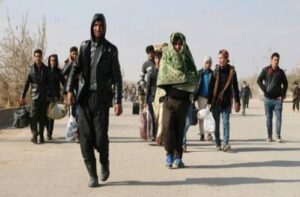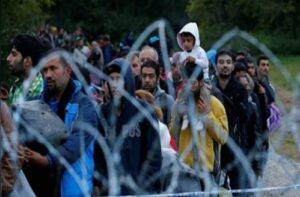
Unemployment, poverty, insecurity and lack of better education in Afghanistan have led to large numbers of families and young people moving abroad and migrating irregularly.
Ali Bigzad, a 15-year-old teenager, traveled to Iran and spent three years in that country on the heels of a treacherous journey. In conversation with Salam Watandar, he said that during his three years of stay in Iran, he was humiliated a lot and all his dreams of a secure and comfortable life in Iran as a good place to live shattered.
After these three troubled years and due to lack of a resident permit, Bigzad felt compelled to move onwards to Europe in search for a secured life. With all the hardships, he had gathered some AFN 500,000 that he paid to a trafficker to take him to Sweden.
That journey began on the Iran-Turkey border, a thorny path that brought many hardships his way. As he explained, due to the large number of immigrants set to embark on this journey, Ali and his companions were made to ride in separate cars. The car in which Hamid, Ali's friend and other companions were riding, crashed on the way to Turkey resulting in multiple deaths.
Ali said he later got to know that the traffickers even took out body parts of Hamid before transporting his body back to Afghanistan. He described this event as the most shocking and horrifying one in his life.
The teenager, after going through all these hardships, somehow made it to Sweden, his desired destination.
His brother, who lived in Sweden, greeted him and took him home. Ali lived with his brother for five years, but his asylum application got rejected several times. He has not yet received his Swedish citizenship card and is waiting for his fate to be known.
Ali has once been arrested by the Swedish police for not having a citizenship card.
Sayed Abdul Basit Ansari, a spokesman for the Ministry of Refugees and Returnees, told Salam Watandar that the ministry was working to prevent irregular migration of citizens, which has catastrophic social consequences.
The spokesman further said that the government, especially the Ministry of Immigration, has always urged citizens of the country that they should not take the path of irregular migration. "In Afghanistan, there are opportunities for citizens to have a home, learn a language and do business, which is not easy for them in other countries," said Fariha Jabarkhil, a consultant at the Immigration Information Center.
According to her, those citizens who leave the country irregularly in order to achieve a life of their dreams face many linguistic and cultural problems and even forced deportation in foreign countries.
The Ministry of Refugees and Returnees officials said there are currently 6.5 million Afghan refugees worldwide, mostly in Iran and Pakistan.
According to the officials, of this number, about 2.5 million Afghan refugees live in Iran, 2.4 million in Pakistan and the rest in many different countries.
Say no to irregular migration!
ENDS





